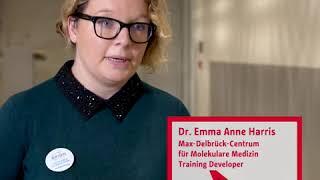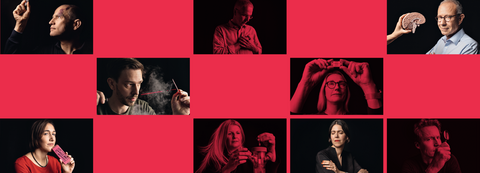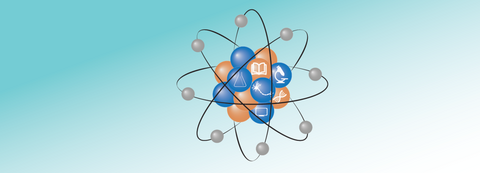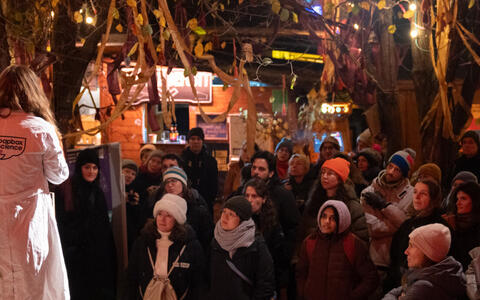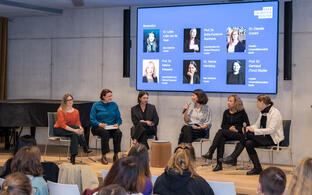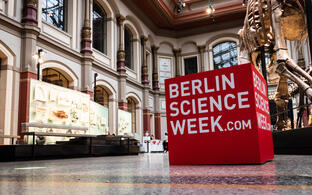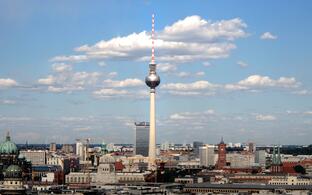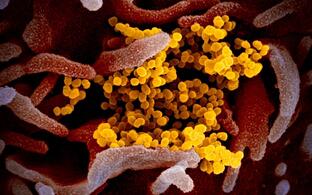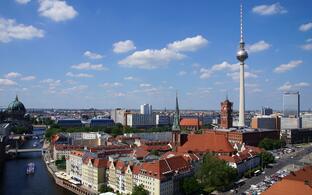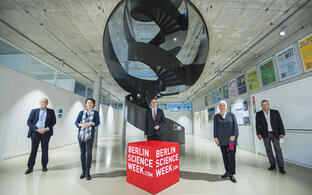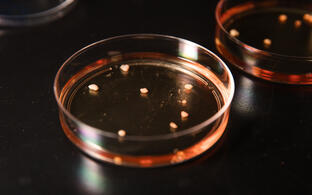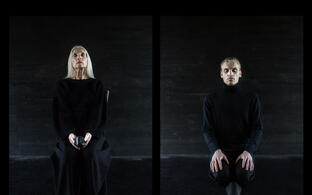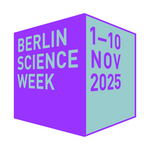
Berlin Science Week
Our program at the science festival 1 - 10 November, 2025
Program
Biopolis: The Podcast
Date: November 1- 2, 2025
Time: 9:30 a.m. - 6 p.m.
Location: Museum für Naturkunde Berlin, Invalidenstr. 43, 10115 Berlin
Language: English, German
Contributors: Theda Bartolomaeus (Forslund Lab)
Symbiosis and Survival: What Microbes Reveal About Our Shared Future
Date: Saturday, November 1, 2025
Time: 2:45 - 3 p.m.
Location: Inspiration Stage, Museum für Naturkunde Berlin, Invalidenstr. 43, 10115 Berlin
Language: English
Contributors: Theda Bartolomaeus (Forslund Lab)
Catching all viruses: a look at global viral genome diversity using wastewater
Date: Sunday, November 2, 2025
Time: 11:30 - 11:45 Uhr
Location: Inspiration Stage, Museum für Naturkunde Berlin, Invalidenstr. 43, 10115 Berlin
Language: English
Contributors: Emanuel Wyler (Landthaler Lab)
Photo Exhibition: Discoverers
Date: November 3 - 7 and 10, 2025
Opening hours: Mo-Fr
Time: 11 - 18 Uhr
Location: MDC-BIMSB, Hannoversche Str 28, 10115 Berlin
Environmental journalist and hobby diver Luka Marie Weber has photographed great white sharks with broken jaws and clipped fins. The frequency of injured sharks has gone up alarmingly over the years.
Podium discussion: 50 Years After “Jaws”: Sharks, Pain, Ethics
Date: Tuesday, November 4, 2025
Time: 4 - 5:30 p.m.
Location: MDC-BIMSB, Hannoversche Str 28, 10115 Berlin
Language: English
Contributors: Sampurna Chakrabarti (Lewin Lab), Victoria Stiglbauer, Luka Marie Weber and Athanasios Balomenos (Moderator)
One Cell at a Time: Measuring The Building Blocks of our Bodies
Date: November 4 and 6, 2025
Time: 6 - 7:30 p.m.
Location: MDC-BIMSB, Hannoversche Str 28, 10115 Berlin
SPARK: Creative processes in the arts and sciences
Date: Wednesday, November 5, 2025
Time: 6 - 8:15 p.m.
Location: MDC-BIMSB, Hannoversche Str. 28, 10115 Berlin
Contributors: SooJin Anjou, Nikolaus Rajewsky, Cicely Parnas, Wolfgang Köhler, Georg Braune and Stefanie Grosswendt
Shaping the future of animal research communication
Date: November 6 -7 , 2025
Time: 9 a.m - 7 p.m. (Thursday) and 9 a.m. - 2 p.m. (Friday)
Location: Max Delbrück Center (MDC.C), Robert-Rössle-Str 10, 13125 Berlin
Language: English
Contributors: European Animal Research Association (EARA)
Berlin PostDoc Day
Date: November 6 - 7, 2025
Time: 9 a.m. - 2 p.m.
Location: Humboldt Graduate School, Luisenstr. 56, 10117 Berlin
Contributors: PostDoc Office
Zeitenwende in der Gesundheitsforschung: Verantwortung und Kommunikation im Umgang mit Tierversuchen
Date: Friday, November 7, 2025
Time: 6 - 8 p.m.
Location: Auditorium CharitéCrossOver (CCO), Charitéplatz 1, Geländeadresse: Virchowweg 6, 10117 Berlin
Language: German
Diverse Minds, Shared Future
Soapbox Science Berlin, LGBTQ+ STEM Berlin
Date: Sunday, November 9, 2025
Time: 3:30 - 5:30 p.m.
Location: Holzmarkt 25, Holzmarktstr 25, 10243 Berlin
Language: English, German
Videos
Biomedical Innovation Ecosystems: Recipes for Success | Science Summit 2024
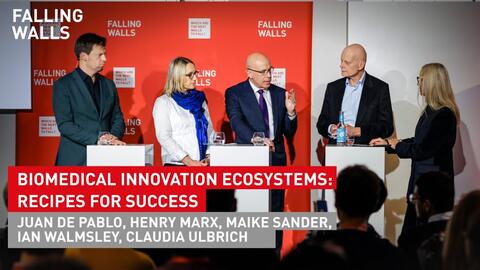
BR50 Panel Discussion: Diversity Instead of Uniformity
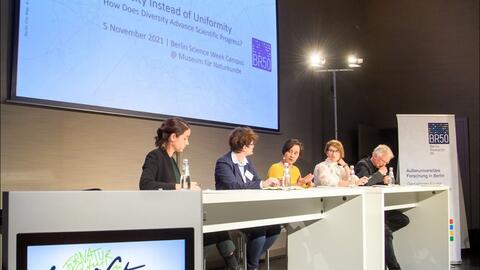
Diversity Instead of Uniformity - How Does Diversity Advance Scientific Progress? | Public Discussion at the Berlin Science Week Campus @ Museum für Naturkunde Berlin | 5 November 2021
Diversity management, gender equality and internationalization have become guiding principles for almost all scientific institutions, especially in Berlin. At the beginning of the year, DFG President Katja Becker stressed that diversity and excellence are inseparable concepts for her. However, it remains true that the further up the career ladder you go, the more uniform the people who reach these positions tend to be. At the same time, many scientists have problems establishing themselves in Germany and face problems with the language, bureaucracy and other personal challenges. Unfortunately, it is also evident that people in the scientific environment are not spared from experiences of discrimination and prejudice.
BLUMEN! – Die Wissenschaftsshow
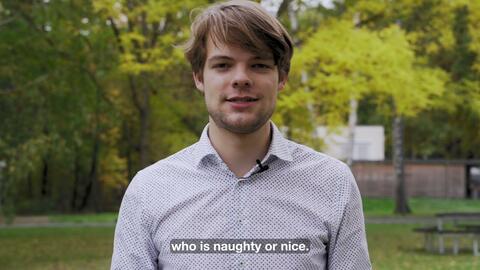
Nun sprechen die Blumen... Drei Berliner Institute hatten eine Woche Zeit, ungewöhnliche Clips zu produzieren, um für ihre Wissenschaft zu begeistern. Brilliante Wissenschaftler*innen des Max-Delbrück-Zentrums für Molekulare Medizn (https://www.mdc-berlin.de/de), des Instituts für Kristallzüchtung (https://www.ikz-berlin.de/) und des Instituts für Gewässerökologie und Binnenfischerei (https://www.igb-berlin.de/) zeigen, wieso ihr Forschungsgebiet das aufregendste der Welt ist. Sie mussten nicht nur unseren Host Friedrich #Liechtenstein überzeugen: Das Online- und das Live-Publikum bewerteten die Clips. Das Gewinner-Video vom #mdcBerlin wird einen Monat lang auf der #Science-Fassade des Paul-Drude-Instituts laufen. Hier seht ihr es schon vorab!
Deep Dive – Being a Postdoc at the MDC Berlin
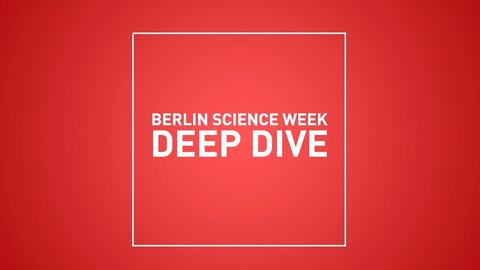
Who is considered a postdoc? What does it mean to become and be a postdoc? Why do postdocs pursue careers in natural sciences? What does the daily life of a postdoc entail? In this #BerlinScienceWeek 2021 "Deep Dive", #mdcBerlin science manager Anne Merks and #FMP postdoctoral research fellow Jeremy Morgan explain their work, motivations, career opportunities and more. Jump right in!
Einblicke in das neue Einstein-Zentrum 3R
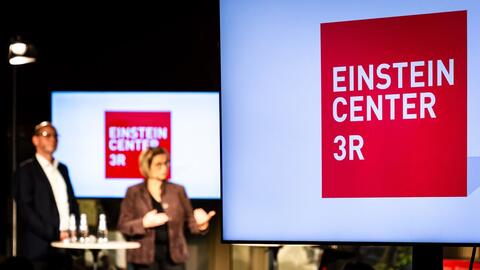
Forschung an Mini-Organen, menschlichem Gewebe oder Multi-Organ-Chips – moderne Technologien versprechen eine Zukunft ohne #Tierversuche. Was ist der aktuelle Stand der #Forschung? Wie funktionieren diese Methoden und wo liegen ihre Grenzen?
Eine moderierte Podiumsdiskussion mit kurzen Filmbeiträgen aus den Laboren widmet sich diesen und weiteren Fragen. Erfahren Sie, wie Berlins #Wissenschaft daran arbeitet, die Forschung im Sinne von #3R – Replace, Reduce, Refine von Tierversuchen – zu verändern und zu verbessern. Auf dem Podium erklären Wissenschaftlerinnen und Wissenschaftlern des neuen Einstein-Zentrum 3R ihre Forschung. Ziel des Zentrums ist es, zur Entwicklung neuer Therapien für menschliche Erkrankungen beizutragen, indem die Übertragbarkeit von Laborerkenntnissen auf den #Patienten verbessert und gleichzeitig der #Tierschutz gestärkt wird.
Cardiovascular Health in the Time of COVID19
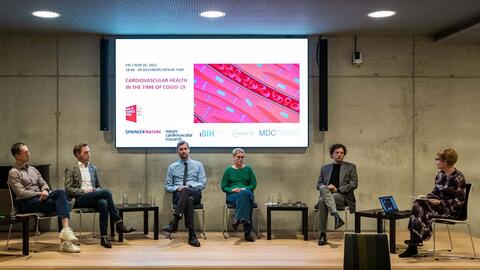
#COVID19, caused by a severe acute respiratory syndrome coronavirus 2 (#SARSCoV2), has become a global #pandemic that has affected the lives of the entire human population. The panel, composed of Berlin-based experts in basic, translational and clinical science focused on cardiovascular disease and immunology, discusses three key aspects:
How are pre-existing #cardiovascular conditions associated with worse outcomes and increased risk of death in patients with COVID-19? How can COVID-19 itself induce cardiovascular disease, such as venous thromboembolism, high blood pressure, acute coronary syndrome, myocardial injury, and arrhythmia? And how can we minimize all these risks by #vaccination?
WHS WS 01 - Thinking Ahead: Prototype Vaccines
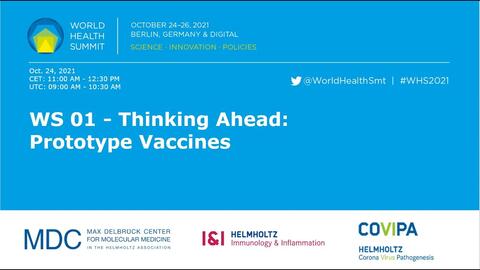
Vaccines are the major cornerstone to control pandemics. This has been demonstrated in the past for instance by the eradication of poxvirus or the global control of poliomyelitis. Given the long history of vaccines, established pipelines for their development and production have been developed. The still ongoing COVID-19 pandemic has enriched this pipeline and although SARS-CoV-2 vaccines have been developed and approved within less than a year, this major achievement built on decades of basic research. Equally important was the massive financial support, accelerated administrative procedures and rapid increase in production capacity. Yet, important challenges remain such as the global distribution of vaccines and insufficient vaccination rates in countries where these vaccines are available.
Retrospect
2023
2021
2020
2019
